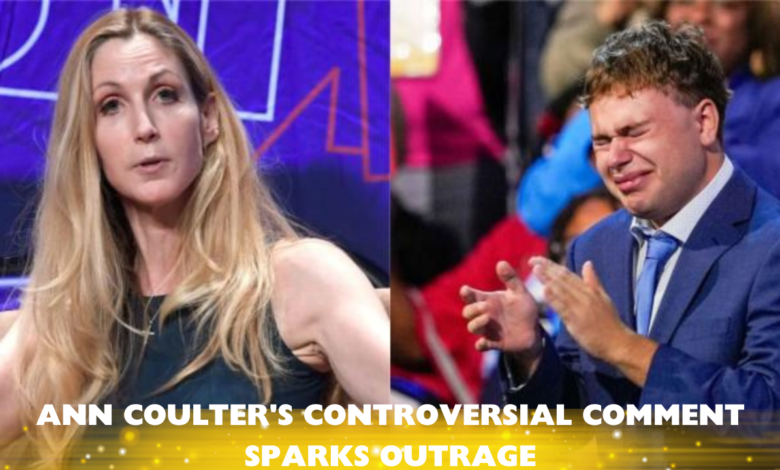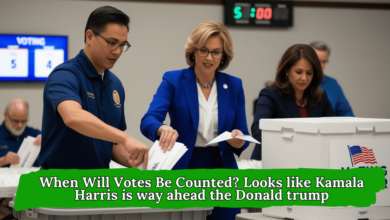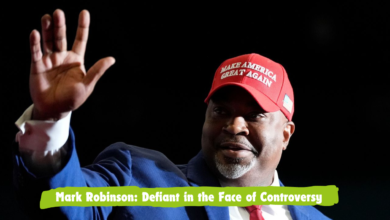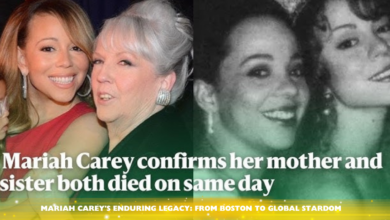Ann Coulter’s Shocking Tweet: 5 Reasons It Backfired Badly

Ann Coulter, a polarizing figure in American politics and media, has often sparked controversy with her bold and unapologetic commentary. Known for her right-wing views and sharp rhetoric, Coulter has found herself at the center of countless debates. However, her recent comments about Minnesota Governor Tim Walz’s son, Gus, have pushed her into the spotlight once again, this time for reasons that highlight the often unforgiving nature of public discourse.
The Incident: Ann Coulter’s Controversial Tweet
In August 2024, Ann Coulter found herself embroiled in yet another controversy, this time involving a highly sensitive matter. During the Democratic National Convention (DNC), Minnesota Governor Tim Walz was nominated as the Democratic vice-presidential nominee. As Walz delivered his speech, his 17-year-old son, Gus, who is neurodiverse, became emotional and proudly pointed at his father, declaring, “That’s my dad.” It was a heartwarming moment that resonated with many, but not with Coulter.
In a now-deleted tweet, Ann Coulter referred to Gus Walz as “weird,” a comment that drew immediate backlash. The tweet, perceived as a cruel and unnecessary attack on a vulnerable teenager, ignited a firestorm of criticism. The comment was not only seen as insensitive but also as a blatant example of the kind of rhetoric that can be harmful, especially when directed at those who are neurodiverse.
Governor Walz’s Response
Governor Tim Walz, a father who has always been protective of his children, did not take Coulter’s comment lightly. In a statement, Walz expressed his deep disappointment and anger over the tweet. He condemned Coulter’s remarks as “soulless” and “bullying,” pointing out the profound impact such comments can have on individuals who are already navigating the challenges of being neurodiverse.
Walz shared that his son Gus was deeply hurt by the comment, breaking down in tears when he learned about it. The governor’s response was not just a defense of his son but a broader call to action against the kind of toxic rhetoric that has become all too common in today’s political landscape. He emphasized the need for compassion, understanding, and respect, especially when discussing issues related to mental health and neurodiversity.
Public Reaction and Backlash
The public response to Coulter’s tweet was swift and overwhelmingly negative. Social media platforms were flooded with messages of support for Gus Walz and condemnation of Ann Coulter. Many labeled her as a “bully” and accused her of targeting a young individual who was simply proud of his father. The backlash highlighted a growing intolerance for comments that are seen as crossing the line, especially when they involve minors or individuals with disabilities.
Critics from across the political spectrum joined in the condemnation. Even those who often align with Coulter’s political views found her comment to be indefensible. The incident served as a reminder that there are boundaries in political discourse that should not be crossed, and that personal attacks, especially on children, are beyond the pale.
Media Coverage and Analysis
The incident quickly became a focal point for media outlets, with extensive coverage in both traditional and online platforms. Major news organizations, including Politico, The Times of India, and Times Now, reported on the controversy, each highlighting different aspects of the situation.
Politico emphasized the emotional impact of the comment on Gus Walz and the broader implications for public discourse. They noted that the incident had sparked a national conversation about the way public figures should engage with sensitive topics, particularly when it involves young people.
The Times of India focused on the backlash against Coulter, describing her as a “bully” and “soulless” for her remarks. They pointed out that this was not the first time Coulter had found herself in hot water for her controversial statements, but that this incident had struck a particularly raw nerve with the public.
Times Now provided an analysis of the political ramifications of the incident, noting that it had the potential to affect public perception of the Democratic ticket. They also highlighted the potential for the controversy to mobilize voters who were already frustrated with the tone of political discourse in the country.
The Broader Implications: Political Discourse and Mental Health Awareness
The controversy surrounding Ann Coulter’s tweet about Gus Walz has raised important questions about the nature of political discourse in the United States. As public figures, politicians and commentators have a responsibility to engage in discussions that are constructive and respectful. When that responsibility is not upheld, it can lead to significant harm, both to individuals and to the broader society.
Mental Health and Neurodiversity
One of the most significant aspects of this incident is the way it has brought attention to issues of mental health and neurodiversity. Gus Walz, like many others, faces unique challenges as a neurodiverse individual. Comments like those made by Coulter can exacerbate these challenges, contributing to a stigma that many are working hard to eliminate.
Governor Walz’s response to the incident highlights the importance of supporting those who are neurodiverse and advocating for their inclusion and acceptance in all areas of life. By standing up for his son, Walz has sent a powerful message that such attacks will not be tolerated and that everyone deserves to be treated with dignity and respect.
The Role of Public Figures
This incident also underscores the role that public figures play in shaping public discourse. Ann Coulter, as a prominent commentator, has a significant platform that she uses to influence public opinion. With that platform comes a responsibility to use her voice in a way that is constructive and thoughtful.
When public figures cross the line, as Coulter did in this case, it can have far-reaching consequences. It is not just the individuals directly involved who are affected; the entire public discourse can be degraded. This incident serves as a reminder that words have power, and those who wield that power must do so with care and consideration.
Conclusion: A Call for Compassion and Respect
The controversy surrounding Ann Coulter’s tweet about Gus Walz has sparked a national conversation about the importance of compassion and respect in public discourse. While Coulter is known for her sharp and often controversial commentary, this incident has highlighted the need for boundaries in the way we engage with each other, particularly when it involves vulnerable individuals.
Governor Tim Walz’s response was a powerful reminder that we must stand up against bullying and advocate for those who are often marginalized in our society. As we move forward, it is crucial that we continue to promote a discourse that is inclusive, respectful, and mindful of the impact that our words can have on others.
This incident is a stark reminder that in a world where words can so easily cause harm, it is more important than ever to choose them wisely. We must all strive to create a public discourse that reflects the values of empathy, understanding, and respect.




